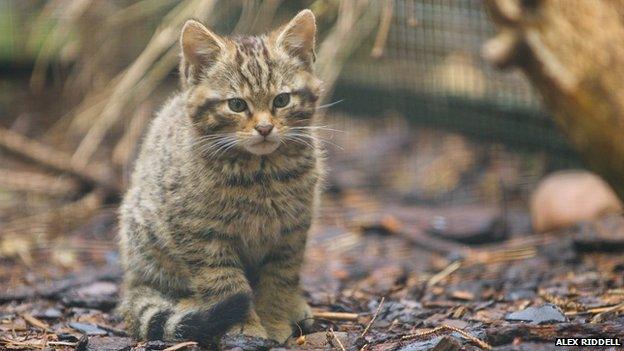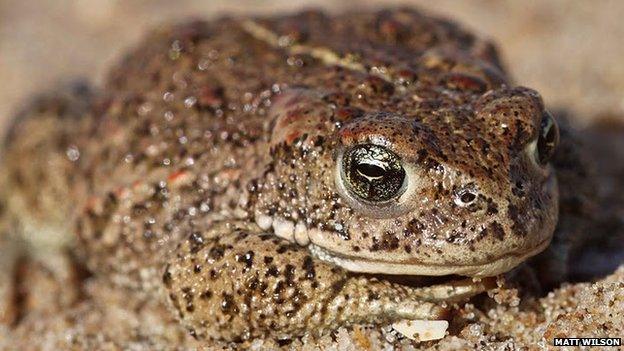Lottery funding for new effort to save Scottish wildcats
- Published

The Scottish Wildcat Association says the SNH project will not save the cats from extinction
Five areas of Scottish wildcat habitat are to be targeted in a new £2m conservation project.
The species is facing extinction, threatened by habitat loss, disease and cross breeding with feral cats.
The Heritage Lottery Fund has offered to give £873,000 towards Scottish Natural Heritage's action plan.
A programme of neutering and vaccinating feral cats will be done as part of the project in areas of Aberdeenshire, Highlands and Tayside.
In the future, SNH may allow wildcats to be trapped for a captive breeding and reintroduction programme.
The Royal Zoological Society of Scotland and the Aspinall Foundation are leading plans for a conservation breeding programme.
However, the Scottish Wildcat Association said the action plan would not go far enough to save pure-bred wildcats and said captive breeding should be the priority for funding.
The SWA's Wildcat Haven project seeks to establish protected breeding areas for the animals on the remote Ardnamurchan peninsula.
Scientist Dr Paul O'Donoghue and the Aspinall Foundation have taken over the association's project.
Environment Minister Paul Wheelhouse has welcomed the offer of lottery funding for the SNH plan.
As well as neutering feral cats, SNH will work with land managers to help reduce risks to wildcats.
There will also be a Scotland-wide awareness raising campaign helping people understand the threats to the animal and what domestic cat owners can do to help.
Mr Wheelhouse said: "The Scottish wildcat is an iconic species that is emblematic of the wild parts of Scotland.
"As a society we have a legal and moral obligation to try and conserve the species, so that it continues to be part of our natural heritage for generations to come."

The Heritage Lottery Fund is also supporting efforts to protect natterjack toads
SNH wildlife ecologist Jenny Bryce said it was an important project.
She said: "Conserving wildcats arouses passions in many people, and the HLF's involvement will go a long way to safeguarding this most elusive of our wild mammals.
"The next stage is to ensure that the project is well-designed and delivers the most benefit for wildcats. This funding will help to ensure this work gets under way."
Grass snake
But Steve Piper, former chairman of SWA, said much of the plan was "PR fluff".
He said the project would lead to a more relaxed approach to what can be defined as a wildcat and numbers would no longer be focused on just pure-bred cats.
"Quite a few pet cat owners worldwide will be waking up to find they have a government-approved Scottish wildcat purring at the end of the bed," he said.
The Heritage Lottery Fund has also awarded a grant of £422,400 to a project which will directly involve 28,000 people in conserving Scotland's amphibian and reptile species.
Collectively known as herptiles, there are 10 native species in Scotland.
Seven are priority species in the UK Biodiversity Action Plan. These include the great-crested newt, the natterjack toad and the grass snake.
- Published21 May 2013
- Published26 September 2012
- Published13 September 2012